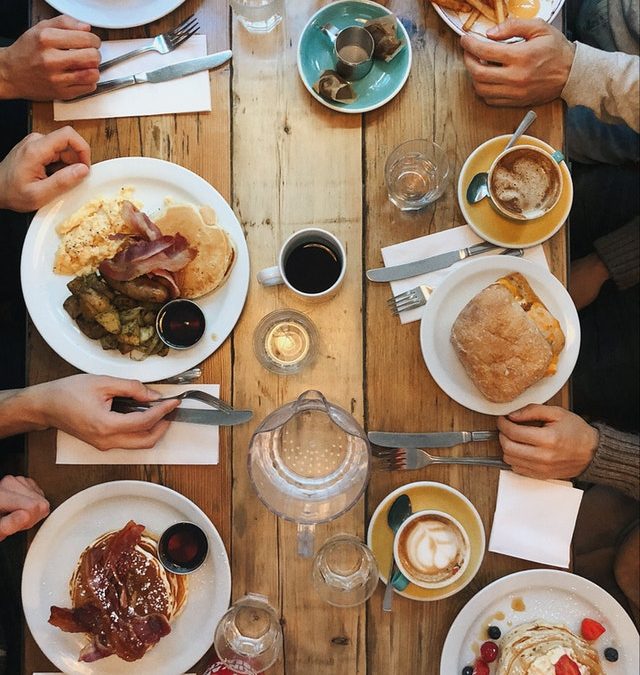You read the book. You’ve been following some great podcasts. The concepts make perfect sense and the science behind it all really speaks to you. So, why does it just feel like it’s not clicking? Read on to troubleshoot what could be happening for you.
First, Let’s Define “Working”
I know you’ve started Intuitive Eating because you want to heal your relationship with food. Could there be a desire to lose weight sabotaging your progress? Remember, Intuitive Eating is really not a weight loss plan. While it leads to weight loss for many people, for many it doesn’t. If you feel like it’s not working because you’re not losing weight, then you may need to re-examine why you’re doing it.
Remember, it’s OK to want to lose weight. That doesn’t go away for quite some time. We live in a culture that glorifies weight loss and diets, so you would almost be crazy not to want weight loss, even a little bit.
The thing is that focusing on weight loss only sabotages your progress in Intuitive Eating. How can you truly make peace with food if you’re thinking constantly about losing weight? How can you listen to your hunger cues if you’re still battling your body?
As much as possible, put the weight issue on the back burner. Then you can reexamine it in a year or so, once you have ironed out your relationship with food. I know this is much easier said than done. Just know that putting emphasis on weight loss is the number one saboteur of your progress in Intuitive Eating.
How to Know if Intuitive Eating is Working
You have stopped binge eating, or you have periods of not binge eating when you normally would.
You can eat meals you love and put food down in between. Or, you’re beginning to choose foods you love sometimes and are occasionally able to not reach for food when you’re not hungry.
You’re not grazing all day with no thought to hunger or fullness. Or, you are beginning to experience this just a little bit.
You’re exercising for enjoyment instead of for calorie burning. Or, you’re thinking about maybe changing your exercise habits because you know they are for the wrong reasons.
I could go on, but I think you’re getting my point. Any progress along the way is just that–progress!
Intuitive Eating is a process that requires lots of trial and error. If you’re seeing mild progress in any of these areas, including just beginning to think differently about food without any real action to back it up–that’s still progress! Don’t second guess yourself. It might be helpful to keep a journal of all the progress you are making. When we acknowledge the progress either out loud talking to someone else or to ourselves, the progress begins to grow!
Common Intuitive Eating Pitfalls
Not eating enough carbs. Almost everyone I begin working with in their first session needs to be reminded to eat more carbs, particularly early in the day. Diet culture infiltrates our decisions about food, telling us that you should “save up” for dinner. Eat less in the day time so you can eat more at night. This tends to backfire, however. You need consistent fuel throughout the day to teach your body to calm the cravings that dieting /restricting has caused–especially carbohydrates.
Good food versus bad food mentality. If you still have lurking beliefs that certain foods are good and others bad, this can color your food choices. Instead of being able to choose food with neutrality (i.e. the pasta is the same as the quinoa, the cake is the same as the fruit) you’ll have a hard time listening to your body. Remember, Intuitive Eating is about dropping into your body’s needs and wants. If you can’t freely choose pasta over quinoa or vice versa, you’ll have a much harder time hearing your body’s needs.
Rebellious eating. You may have voices in your head from your parents or diet culture telling you that it’s “bad” to eat certain foods, and your “Diet Rebel” may be eating at those voices. This is another form of the good food versus bad food mentality, but you may be choosing “bad” food simply out of rebellion at diet culture instead of what your body needs. The way to work with this is through self-talk. “Ok, I’m really wanting the donuts right now. I can tell that this is the Diet Rebel in my head. That’s OK. It’s normal to have a Diet Rebel in my head. Diet culture has stolen so much from me. If I want the donuts I can totally have them with no restrictions. And, I am choosing to experience my body right now. What does my body need or want?” Talking yourself through it with gentleness is key.
Not planning ahead for when you’ll be hungry. It can feel like dieting, so we don’t want to do it. But, Intuitive Eating does require a bit of forethought. If you’re consistently getting super hungry at work, and you end up eating the office candy and cookies, you may not feel very well. While Intuitive Eating does ask you to make peace with food (i.e. it’s OK to eat office candy when you’re hungry), it also requires you to pay attention to your body’s cues. If your body is telling you it’s hungry and it doesn’t respond that well to eating cookies for lunch, it may be time to plan your lunch ahead of time. We can see this as self-care versus dieting. If it comes from a place of “I want to support my body and feel good all day,” that is very different from “I am going to bring my special lunch because I am trying to lose weight.”
Eating in front of the computer or TV. Eating mindlessly while doing other things is another pitfall. In the early days of Intuitive Eating it is a good idea to “uncouple” food and other activities. Just focus on what you’re eating and bring mindfulness as much as possible. Remember, you’re working on your relationship with food and experiencing it in a new way. It is hard to do this if you’re distracted. This doesn’t mean that forever you’ll have to watch movies without popcorn. But, for now, solidify good habits so that you can return to eating food in front of TV with a new way of being. I know this may seem crazy or impossible, especially if you live alone. But, try it. Even if you just start with one meal a day. I promise it helps a lot!
Eating for emotions. This is another big place where people get tripped up. Eating for emotions is so habitual. I know the first time I read the Intuitive Eating book I wondered where the rest of the instructions were for emotional eating. I felt like I needed a whole library of books to take care of that problem! It takes some concerted effort, but it can be overcome. See my detailed post about healing from emotional eating for more information. https://eatingrecoverycoach.com/2020/01/13/are-you-an-emotional-eater/
Don’t give up!
I know Intuitive Eating can be discouraging. Sometimes it’s hard to see your own progress. It’s even harder when you’re inundated with diet messages in our culture. Stay the course. The other option is what? Continuing to live a life battling food and weight. That’s no way to live. Your freedom is so worth it. Keep going!


